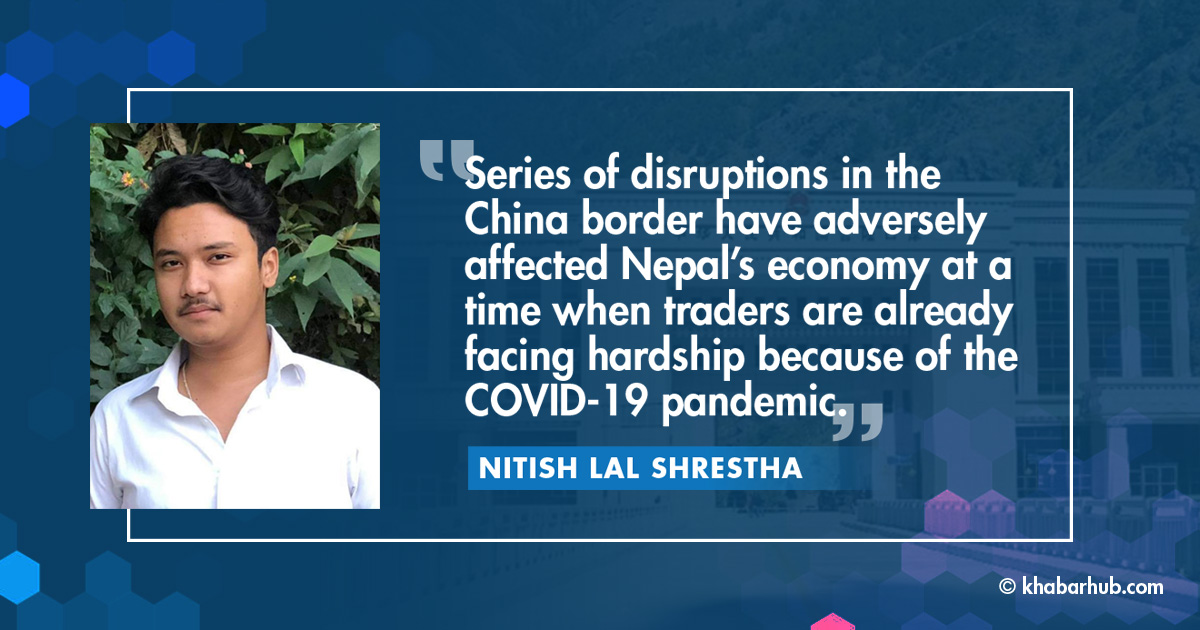Disruption in trade — currently being witnessed along the Nepal-China border — is sure to adversely impact Nepal’s economy.
The “mysterious unfavorable trading environment” by China has raised apprehensions once again about its intimidating approach towards Nepal – despite graduating from a landlocked to a “land-linked” country.
This is not a new phenomenon as Nepal has repeatedly faced direct or indirect economic blockades in the past by Nepal’s neighbors, for not so convincing reasons such as earthquakes, natural disasters, etc.– the latest being coronavirus pandemic.
Such unpleasant business environments have adversely impacted the socio-economic aspects, consequently affecting the normal life of the Nepali people.
Nepali citizens underwent a terrible time in 2015 when India was alleged of imposing an “undeclared” blockade for around four months.
Currently, China’s reluctance to open the Rasuwagadhi and Tatopani checkpoints is well recognized but it is not mentioned as a blockade, and treated as an issue to be resolved diplomatically.
The majority of the Nepali citizens are yet to realize this China’s diplomacy, sometimes referred to as bitter, in the Nepal-China checkpoints. Reason: coronavirus pandemic!
As a result, Nepali entrepreneurs are losing billions of rupees. Unfortunately, an entrepreneur even committed suicide as his goods were stuck at the China border for months.
Having said that, China’s position about the checkpoint issue seems unreasonable by not allowing Nepali goods to enter Nepal at a time when India has maintained flexibility by allowing entry of Nepali trucks despite the coronavirus pandemic.
The series of such an unfavorable environment in the China border has adversely affected Nepal’s government and customs authorities, and traders who are already facing hardship because of the COVID-19 pandemic since last January.
Unfortunately, both the checkpoints — Rasuwagadhi and Tatopani — have been closed and reopened up to six times.
China closed both checkpoints for the first time on January 27 citing coronavirus pandemic. Of them, the Tatopani checkpoint was unilaterally opened on July 11 and the Rasuwagadhi checkpoint was opened only on July 6.
However, even after resuming the border on July 6, the Chinese authorities created hassles by not allowing sufficient goods to enter Nepal.
China started sending only four containers to Nepal daily in the pretext of coronavirus pandemic through its containers.
The four containers, indeed, were trifles at a time when thousands of loaded containers were marooned across the border waiting for their turn to enter Nepal.
Nepali trucks then had to load the goods ferried by the Chinese containers at the border – an instance, unreasonable and unexplainable on the part of Chinese authorities as the process was time-consuming and involved additional cost.
After the closure of the Tatopani checkpoint in the first week of July, apples entering Nepal through the checkpoint began to support the daily quota of four trucks, further prolonging the waiting period for the goods at the China border.
It should be noted that the Tatopani checkpoint was closed after a landslide hit the Chinese territory on August 28.
Goods started to enter Nepal after the roads were repaired during which the checkpoint was opened after agreeing to send twice as many containers daily as in the previous time.
However, three days later on September 4, the Chinese side closed the checkpoint without any tangible reason.
Likewise, the Chinese side closed the Tatopani border again in the first week of July citing fears that the Chinese glacier could burst and flood the Bhotekoshi River.
The checkpoint was reopened on October 16. However, it was closed again after a worker tested positive for coronavirus. After quite an extensive effort on the part of Nepali authorities, the checkpoint is open from October 29.
However, currently, not more than six to eight containers enter Nepal daily from the two checkpoints.
According to the Department of Customs, two containers enter Nepal from the Tatopani checkpoint; five containers enter through the Rasuwagadhi checkpoint on a daily basis.
While on normal days, around 15-20 containers used to enter Nepal through the Tatopani checkpoint and Rasuwagadhi checkpoint.
This way the confidence of Nepali entrepreneurs to continue trade with China seems to get weaker.
According to the Department’s estimate, as many as 800 containers are currently stuck at the Tatopani checkpoint and almost 600 at the Rasuwagadhi checkpoint.
It should be noted that the Government of Nepal seems to be serious about the issue as the KP Oli-led government formed after the promulgation of the new Constitution signed a transit agreement with China to allow the import and export of goods from third countries through Chinese ports.
According to the agreement, Nepal can use four seaports and three dry ports of China. However, the fact remains that the details related to those ports are still unclear and unfamiliar to the people because of which the Nepali entrepreneurs are yet accustomed and not familiar with the time and cost from the allocated dry ports and seaports.
With the signing of the agreement, PM Oli announced that Nepal has been transformed from a landlocked country to a land-linked country. In fact, he has been reiterating it even now.
China, too, has said that Nepal would benefit to call itself a land-linked country rather than a landlocked one.
To recall, Chinese President Xi Jinping, during his Nepal visit on October 12, 2019, had said that Nepal would graduate into a land-linked country.
Right after Chinese President Xi’s announcement, this issue is being mentioned in every document issued by the Chinese government and its agencies in Nepal.
A similar statement was made by the Chinese side at a joint interaction program between the government of China and Nepal held some time ago.
Having said that, China’s position about the checkpoint issue seems unreasonable by not allowing Nepali goods to enter Nepal at a time when India has maintained flexibility by allowing entry of Nepali trucks despite the coronavirus pandemic.
An average of 700 containers enters Nepal daily via the Birgunj-Raxaul border.
What has to be emphatically noted is that while the distance from Rasuwa to Kathmandu is 147 km, which means more than ten hours’ drive for a fully loaded truck, it costs almost 75,000-85,000 NRS.
It’s been just a year of President Xi Jinping’s visit to Nepal, and notwithstanding the President’s commitments to ease the trade between Nepal and China; Nepal has been facing border hurdles.
On the other hand, bringing goods from the Raxaul checkpoint to Kathmandu is less costly i.e price ranging from 30,000-32,000 NRS.
This is certainly due to easy transportation since trucks laden with goods from India directly come to the national capital.
However, in the case of China, the goods are loaded in Nepali trucks at the border, including Tatopani, which is some 119 km from Kathmandu. The cost of loading goods from container to truck still remains.
India, which has currently a much higher number of coronavirus impacts than China, has been quite acquiescent on humanitarian grounds.
Had India imposed such an undeclared blockade at this adverse time and situation, there would have been hullabaloos throughout the country, and protests would have been organized against the southern neighbor.
Nepali traders and entrepreneurs, who had a ray of hope after the transit agreement was signed between Nepal and China, have been disappointed with the Chinese attitude.
The move on the part of China in halting containers has compelled them to bear a huge loss during a difficult time, and at a time when the blockade has disrupted transportation of goods such as food items and garments at the height of Nepal’s national holiday season.
Winter is here, and the goods which are stuck at the border were meant for summer because of which the traders are bound to suffer a heavy loss.
Moreover, food items generally have expiry dates. Since the goods have been stuck for almost a year now, the food items are sure to be wasted incurring a loss of millions.
China has been reluctant despite several rounds of bilateral talks on resolving the border issue.
Since several rounds of bilateral talks between the two governments have failed to yield any concrete outcome, critics have cast doubts and skepticism on future trade prospects between Nepal and China.
It’s been just a year of President Xi Jinping’s visit to Nepal, and notwithstanding the President’s commitments to ease the trade between Nepal and China; Nepal has been facing border hurdles.
China is capable of making things happen in a few days. It is surprising why it is dilly-dallying on this particular.
Nepali people had high expectations from China since Nepal, too, is currently governed by a Communist government.
Despite having the same ideology, the two governments have failed to resolve the differences.
Since several rounds of bilateral talks between the two governments have failed to yield any concrete outcome, critics have cast doubts and skepticism on future trade prospects between Nepal and China.
Some have even raised bigger questions about whether Nepal should depend on China for future trades and businesses in the future.
It is high time that both governments held bilateral talks and resolved this issue at the earliest.
It would be a positive signal if Nepal could be assured that there would be no more hurdles at the checkpoints in the future. However, time will tell!









Comment